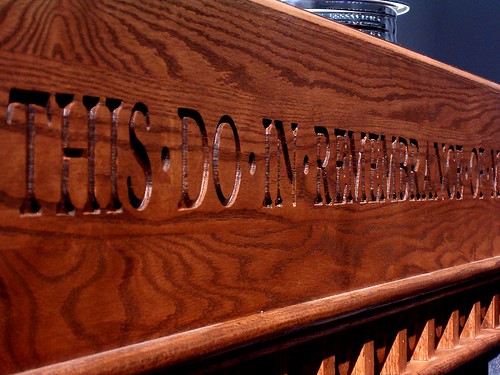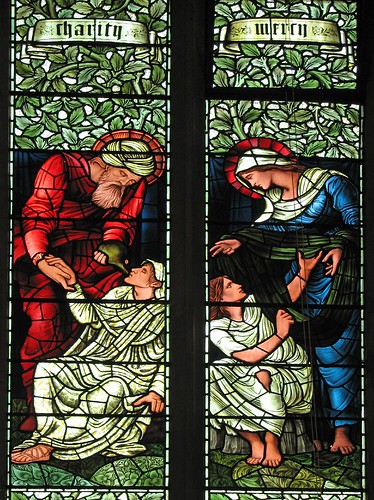Author Archives: scott
CHAP. XIV. The Parson in Circuit.
Well I’ve submitted a section for my thesis, so back to the blog….We return to George Herbert’s The Country Parson:
THe Countrey Parson upon the afternoons in the week- days, takes occasion sometimes to visite in person, now one quarter of his Parish, now another. For there he shall find his flock most naturally as they are, wallowing in the midst of their affairs: whereas on Sundays it is easie for them to compose themselves to order, which they put on as their holy-day cloathes, and come to Church in frame, but commonly the next day put off both. When he comes to anyhouse, first he blesseth it, and then as hee finds the persons of the house imployed, so he formes his discourse. Those that he findes religiously imployed, hee both commends them much, and furthers them when hee is gone, in their imployment; as if hee findes them reading, hee furnisheththem with good books; if curing poor people, hee supplies them with Receipts, and instructs them further in that skill, shewing them how acceptable such works are to God, and wishing them ever to do the Cures with their own hands, and not to put them over to servants. Those that he finds busie in the works of their calling, he commendeth them also: for it is a good and just thing for every one to do their own busines. But then he admonisheth them of two things; first, that they dive not too deep into worldly affairs, plunging themselves over head and eares into carking, and caring; but that they so labour, as neither to labour anxiously, nor distrustfully, nor profanely. Then they labour anxiously, when they overdo it, to the loss of their quiet, and health: then distrustfully, when they doubt Gods providence, think- ing that their own labour is the cause of their thriving, as if itwere in their own hands to thrive, or not to thrive. Then they labour profanely, when they set themselves to work like brute beasts, never raising their thoughts to God, nor sanctifying their labour with daily prayer; when on the Lords day they do unnecessary servile work, or in time of divine service on other holy days, except in the cases of extreme poverty, and in the seasons of Seed-time, and Harvest. Secondly, he adviseth them so to labour for wealth and maintenance, as that they make not that the end of their labour, but that they may have wherewithall to serve God the better, and to do good deeds. After these discourses, if they be poor and needy, whom he thus finds labouring, he gives them somewhat; and opens not only his mouth, but his purse to their relief, that so they go on more cheerfully in their vocation, and himself be ever the more welcome to them. Those that the Parson findes idle,or ill imployed, he chides not at first, for that were neither civill, nor profitable; but always in the close, before he departs from them: yet in this he distinguisheth; for if he be a plaine countryman, he reproves him plainly; for they are not sensible of finenesse: if they be of higher quality, they commonly are quick, and sensible, and very tender of re- proof: and therefore he lays his discourse so, that he comes to the point very leasurely, and oftentimes, as Nathan did, in the person of another, making them to reprove themselves. However, one way or other, he ever reproves them, that he may keep himself pure, and not be intangled in others sinnes. Neither in this doth he forbear, though there be company by: for as when the offence is particular, and against mee, I am to follow our Saviours rule, and to take my brother aside, and reprove him; so when the offence is publicke, and against God, I am then to follow the Apostles rule, I Timothy 5. 20. and to rebuke openly that which is done openly. Besides these occasionall discourses, the Parson questions what order is kept in the house, as about prayers morning and evening on their knees, reading of Scripture, catechizing, singing of Psalms at their work, and on holy days; who can read, who not; and sometimes he hears the children read himselfe, and blesseth them, encouraging also the servants to learn to read, and offering to have them taught on holy-dayes by his servants. If the Parson were ashamed of particularizing in these things, hee were not fit to be a Parson: but he holds the Rule, that Nothing is little in Gods service: If it once have the honour of that Name, it grows great instantly. Wherfore neither disdaineth he to enter into the poorest Cottage, though he even creep into it, and though it smell never so lothsomly. For both God is there also, and those for whom God dyed: and so much the rather doth he so, as his accesse to the poor is more comfortable, then to the rich; and in regard of himseife, it is more humiliation. These are the Parsons generall aims in his Circuit; but with these he mingles other discourses for conversation sake, and to make his higher purposes slip the more easily.
In Herbert’s ideal of visiting the members of his parish, a couple of things stand out to me. First, his idea is not to have a ‘pastoral visit’ as some event at someone’s home, when they can put the Bible on the coffee table and make the sure the kids behave, but rather it is to meet them in their everyday lives, or as he wonderfully puts it ‘wallowing in the midst of their affairs’. I think Herbert has the idea right. Ministering like this his hard to count how many ‘visits’ you made at the end of the month, but by simply being present in your community you are a natural part of the congregation rather than a religious ornament for special occassions. In this a minister is reminded of what parishioners face and deal with, and brings a reminder of the church into the everyday life of work, study and play.
The other thing that caught my attention was how the Parson is to provide for the particular needs of his parishioners: books for those reading, herbs for the sick etc… While there is certainly an authoriatarian tone most modern folks would be uncomfortable with, there is also a sense in which the Parson should take not of what his people are doing and make efforts to provide and instruct so that they can be encouraged and improve in their own work. There is a sense of personal vocation for all people ‘for it is a good and just thing for every one to do their own busines’.
Image by by Chris (archi3d)
Update
Just to let folks know, I’m finishing up a section of my thesis to send my supervisor. I’ll blog more after I get it finished.
Pity the Fool
(thanks Allan)
The Country Parson: CHAP. XIII. The Parson’s Church.
THe Countrey Parson hath a speciall care of his Church, that all things there be decent, and befitting his Name by which it is called. Therefore first he takes order, that all things be in good repair; as walls plaistered, windows glazed, floore paved, seats whole, firm, and uniform, especially that the Pulpit, and Desk, and Communion Table, and Font be as they ought, for those great duties that are performed in them. Secondly, that the Church be swept, and kept cleane without dust, or Cobwebs, and at great festivalls strawed, and stuck with boughs, and perfumed with incense. Thirdly, That there be fit, and proper texts of Scripture every where painted, and that all the painting be grave, and reverend, not with light colours, or foolish anticks. Fourthly, That all the books appointed by Authority be there, and those not torne, or fouled, but whole and clean, and well bound; and that there be a fitting, and sightly Communion Cloth of fine linnen, with an handsome, and seemly Carpet of good and costly Stuffe, or Cloth, and all kept sweet and clean, in a strong and decent chest, with a Chalice, and Cover, and a Stoop, or Flagon; and a Bason for Almes and offerings; besides which, he hath a Poor-mans Box conveniently seated, to receive the charity of well minded people, and to lay up treasure for the sick and needy. And all this he doth, not as out of necessity, or as putting a holiness in the things, but as desiring to keep the middle way between superstition, and slovenlinesse, and as following the Apostles two great and admirable Rules in things of this nature: The first whereof is, Let all things be done decently, and in order: [I Cor. 14:40]The second, Let all things be done to edification, I Cor. 14 [:26]. For these two rules comprize and include the double object of our duty, God, and our neighbour; the first being for the honour of God; the second for the benefit of our neighbor. So that they excellently score out the way, and fully, and exactly contain, even in externall and indifferent things, what course is to be taken; and put them to great shame, who deny the Scripture to be perfect.
I like this section, no real profound meanings, but it shows the personal care the minister should have for the Church house. It’s not above him to make sure the floors are swept. I like the details that give us a strong image of what a Church would be like during his time. I did notice that he says scripture should be painted on the walls. I find this interesting since it is a reliance on the written word rather than images, yet it is not a stark space void of any decoration.
I wonder how often folks refer to scripture, like the two Herbert quotes when considering the look of a Church?
Image: Communion by Pastorbuhro
Family Tree
I’ve been playing around with a cool website Geni this afternoon. It’s a family tree site that can let other members of your family contribute. I was adding some of my wife’s ancestors when I made a cool discovery. I knew she had a famous uncle named Daniel but I didn’t realize she had another uncle who was a famous Baptist preacher. I knew the name sounded familiar, but it took me a while to realize that it wasn’t his preaching that made Elijah Craig famous.
The Best Worst Sunday
Rural Schools
Saw this article this morning. It reports that a recent study shows kids in rural schools do better in a variety of subjects than kids in the city. The article suggests that rural schools tend to have a lower student to teacher ration, but I wonder if growing up in the country doesn’t help out too.
The Country Parson: Chap. XII. The Parson’s Charity.
THe Countrey Parson is full of Charity; it is his pre- dominant element. For many and wonderfull things are spoken of thee, thou great Vertue. To Charity is given the covering of sins, I Pet. 4. 8. and the forgivenesse of sins, Matthew 6. 14. Luke 7. 47. The fulfilling of the Law, Romans 13. 10. The life of faith, James l. 26. The blessings of this life, Proverbs 22. 9. Psalm 41. 2. And the reward of the next, Matth. 25. 35. In brief, it is the body of Religion, John 13. 35. And the top of Christian vertues, I Corin. 13. Wherefore all his works rellish of Charity. When he riseth in the morning, he bethinketh himseife what good deeds he can do that day, and presently doth them; counting that day lost, wherein he hath not exercised his Charity. He first considers his own Parish, and takes care, that there be not a begger, or idle person in his Parish, but that all bee in a competent way of getting their living. This he effects either by bounty, or perswasion, or by authority, making use of that excellent statute, which bindes all Parishes to maintaine their own. If his Parish be rich, he exacts this of them; if poor, and he able, he easeth them therein. But he gives no set pension to any; for this in time will lose the name and effect of Charity with the poor people, though not with God: for then they will reckon upon it, as on a debt; and if it be taken away, though justly, they will murmur, and repine as much, as he that is disseized of his own inheritance. But the Parson having a double aime, and making a hook of his Charity, causeth them still to depend on him; and so by continuall, and fresh bounties, unexpected to them, but resolved to himself, hee wins them to praise God more, to live more religiously, and to take more paines in their vocation, as not knowing when they shal be relieved; which otherwise they would reckon upon, and turn to idlenesse. Besides this generall provision, he hath other times of opening his hand; as at great Festivals, and Communions; not suffering any that day that hee receives, to want a good meal suting to thejoy of the occasion. But specially, at hard times, and dearths, the even parts his Living, and life among them, giving some corn outright, and selling other at under rates; and when his own stock serves not, working those that are able to the same charity, still pressing it in the pulpit, and out of the pulpit, and never leaving them, till he obtaine his desire. Yet in all his Charity, he distinguisheth, giving them most, who live best, and take most paines, and are most charged: So is his charity in effect a Sermon. After the consideration of his own Parish, he inlargeth himself, if he be able, to the neighbour-hood; for that also is some kind of obligation; so doth he also to those at his door, whom God puts in his way, and makes his neighbours. But these he helps not without some testimony, except the evidence of the misery bring testimony with it. For though these testimonies also may be falsifyed, yet considering that the Law allows these in case they be true, but allows by no means to give without testimony, as he obeys Authority in the one, so that being once satisfied, he allows his Charity some blindnesse in the other; especially, since of the two commands, we are more injoyned to be charitable, then wise. But evident miseries have a naturall priviledge, and exemption from all law. When-ever hee gives any thing, and sees them labour in thanking of him, he exacts of them to let him alone, and say rather, God be praised, God be glorified; that so the thanks may go the right way, and thither onely, where they are onely due. So doth hee also before giving make them say their Prayers first, or the Creed, and ten Commandments, and as he finds them perfect, rewards them the more. For other givings are lay, and secular, but this is to give like a Priest.
Just a few notes on Charity:
- It is done in ways that maintains dignity, through giving work or selling at reduced rates.
- It should be given in a way to avoid it being expected or obligated.
- The minister takes the initiative and lead personally before preaching it.
- Though it should start in the parish, it should extend beyond the bounds if resources allow.
- It should be given in a way that reinforces good living.
Question for the ministers: What policies does your church, or what practices do you personally have about providing charity in your local community?
(Image is Charity & Mercy by Lawrence OP: click on picture for his Flickr site)
PAS
Summer’s a busy time for us. I’m away this week teaching worship at the Cumberland Presbyterian Church’s Program of Alternate Studies. I’ll be back to posting next week.


